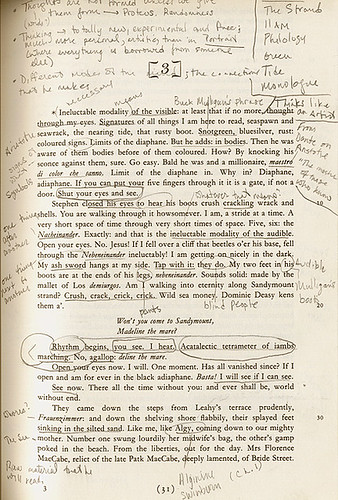In February I wrote a short defense of marginalia. To me, marginalia makes used books more interesting and borrowed books more personal (let me be clear I don't write in books I borrow - I am referring to my own books that I borrow out, or books I borrow from others who have written their own annotations). It marks ownership and reveals reader's nuances. It's also a way of connecting and responding to the author - alive or dead.
Recently I stumbled across an article in New York Times Magazine that made me quite happy: "What I Really Want Is Someone Rolling Around in the Text", in which Sam Anderson writes a longer, much more eloquent defense of marginalia,
This wasn’t exactly radical behavior — marking up books, I’m pretty sure, is one of the Seven Undying Cornerstones of Highly Effective College Studying. But it quickly began to feel, for me, like something more intense: a way to not just passively read but to fully enter a text, to collaborate with it, to mingle with an author on some kind of primary textual plane.Then he touches on a ereader fantasy that I found quite interesting. With the advent of ereaders, we have a way of gathering the marginalia that is found written in physical books, most notably the best and most intelligent marginalia written by famous authors and literary critics, and offering the readers an option of viewing this marginalia on their ereader. In short, the ability to read notes from "history's most interesting book markers". He calls this a sort of "readerly utopia" and I couldn't agree more. Amazon has already got something in the works that will enable public note sharing on its Kindle, which may suggest Anderson's fantasy isn't so distant.
For those of you that abhor marginalia (I remember quite a few of you from my last defense) rest assured this feature wouldn't affect your reading experience. As Anderson explains,
I understand the objection, but in the world of e-books, marginalia would be purely value-added, appearing and disappearing at the touch of a button. It would be like the option of watching a film with the directors’ commentary — a nice bonus but also easy to ignore. And it would allow a whole new wave of readers to discover the pleasure of the words in the margins.Now that people, that would give me reason enough to buy an ereader.


